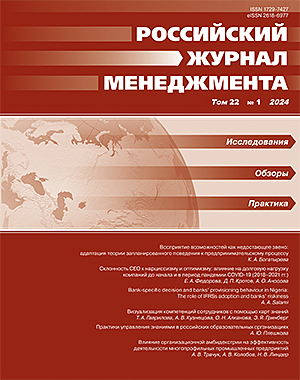Knowledge management practices in Russian educational institutions
DOI:
https://doi.org/10.21638/spbu18.2024.105Abstract
Goal: the aim of this study is to analyze the practices of knowledge management in Russian educational institutions and compare the obtained results with foreign practices.
Metodology: the systematic analysis of literature and the quantitative survey of respondents of Russian educational institutions were carried out. The content of 57 scientific articles was analyzed; 74 unique knowledge management practices were identified and grouped for the survey. Based on the responses of 120 heads of administrative divisions of educational organizations, redistribution of the identified practices was carried out in the key areas of application, thereby forming a different set of practices from foreign countries.
Findings: the analysis and systematization of secondary sources of information revealed a set of knowledge management practices in Russian educational institutions that differ from the foreign practices. The descriptive research and literature review identified the mostly used knowledge management practices in Russia.
Originality and contribution of the authors: the work contributes to the field of knowledge management by proposing the differences between foreign and Russian knowledge management practices, as well as supplementing and modifying the existing set of practices in the context of educational organizations.
Keywords:
knowledge management, knowledge management practices, educational organizations, knowledge sharing, strategic knowledge management
Downloads
References
References in Latin Alphabet
Translation of references in Russian into English
Downloads
Published
How to Cite
Issue
Section
License
Articles of the Russian Management Journal are open access distributed under the terms of the License Agreement with Saint Petersburg State University, which permits to the authors unrestricted distribution and self-archiving free of charge.





